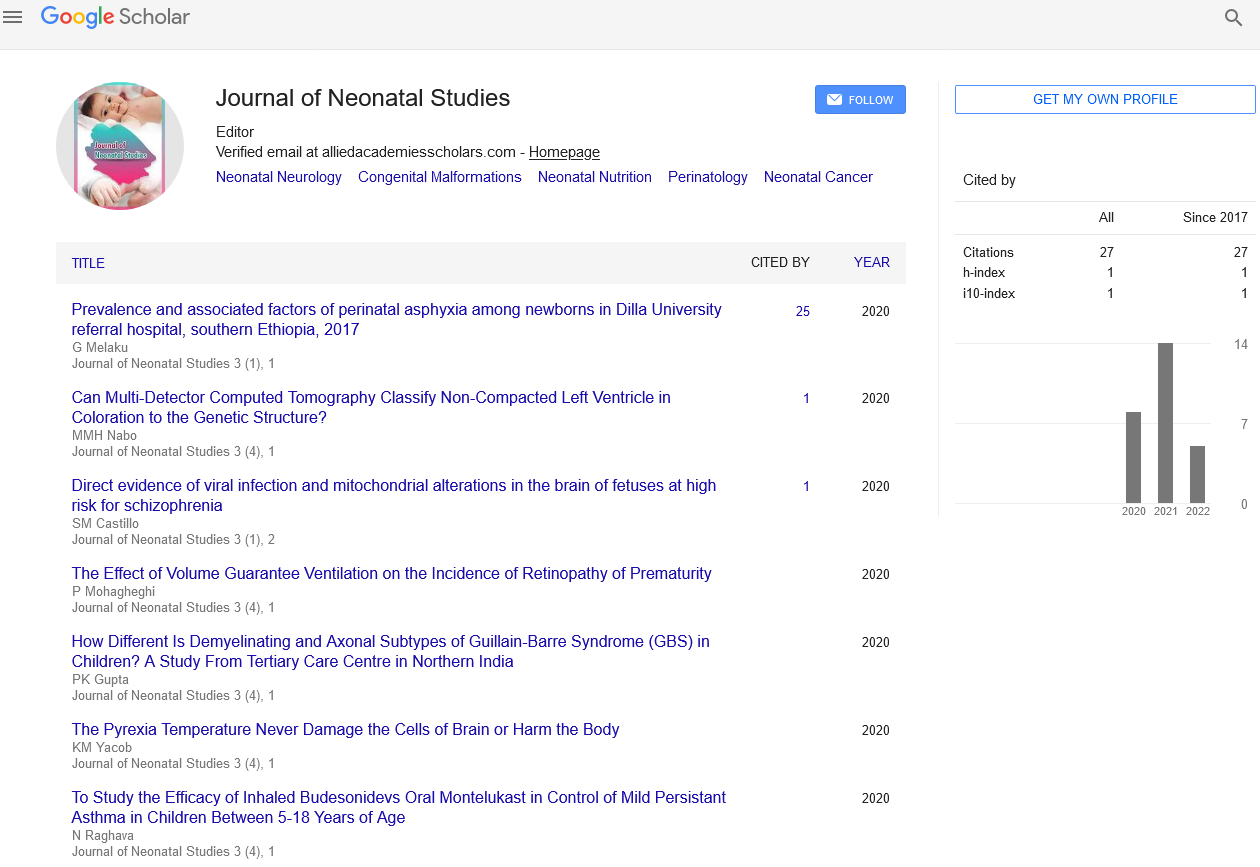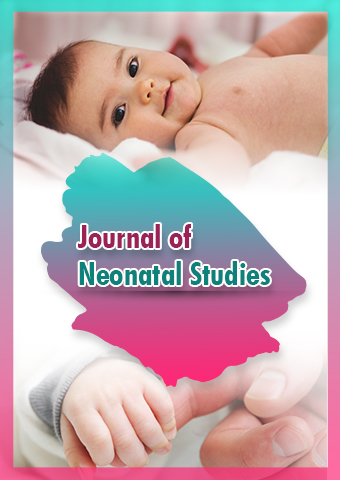Perspective - Journal of Neonatal Studies (2024) Volume 7, Issue 1
Guiding the First Steps: The Vital Role of Neonatal Nursing in Infant Care
- Corresponding Author:
- Aifen Xia
Department of Nursing, Peking University, Beijing, China
E-mail: Xia1979@143.in
Received: 03-Jan-2024, Manuscript No. JNS-24-124922; Editor assigned: 05-Jan-2024, PreQC No. JNS-24-124922 (PQ); Reviewed: 19-Jan-2024, QC No. JNS-24-124922; Revised: 25-Jan-2024, Manuscript No. JNS-24-124922 (R); Published: 05-Feb-2024, DOI: 10.37532/JNS.2024.7(1).187-189
Introduction
Neonatal nursing stands as a cornerstone in the intricate web of healthcare, specializing in the care of newborns in their most vulnerable days of life. The neonatal period, defined as the first 28 days of life, requires a unique set of skills and expertise to address the specific needs of infants, whether they are born prematurely, with medical complexities, or experiencing challenges in their early days. In this article, we will explore the critical role of neonatal nursing, the responsibilities of neonatal nurses, challenges they face, and the profound impact they have on the health and well-being of newborns and their families.
Description
The role of neonatal nursing
Neonatal nurses play a pivotal role in the care and support of newborns, providing specialized attention to infants in various settings, including Neonatal Intensive Care Units (NICUs), special care nurseries, and postpartum units. The responsibilities of neonatal nurses encompass a wide range of tasks aimed at ensuring the health and development of newborns.
Assessment and monitoring
Neonatal nurses are responsible for conducting thorough assessments of newborns, monitoring vital signs, and observing for any signs of distress or complications. This includes evaluating respiratory status, heart rate, temperature, and neurological function.
Feeding support
Supporting and facilitating feeding is a crucial aspect of neonatal nursing. Neonatal nurses guide mothers in breastfeeding techniques, monitor infant feeding patterns, and may administer enteral feedings to infants who require nutritional support.
Medication administration
Administering medications to newborns, including preterm infants, requires precision and expertise. Neonatal nurses are trained to administer medications, monitor for potential side effects, and collaborate with the healthcare team to adjust treatment plans as needed.
Family education and support
Neonatal nurses serve as educators and sources of support for families. They provide information about infant care, developmental milestones, and signs of potential health concerns. Neonatal nurses play a crucial role in ensuring that parents feel informed and empowered to care for their newborns.
Collaboration with multidisciplinary teams
Neonatal nurses work collaboratively with a multidisciplinary team of healthcare professionals, including neonatologists, respiratory therapists, lactation consultants, and social workers. This teamwork ensures comprehensive care for newborns with diverse medical needs.
Advocacy for infants and families
Serving as advocates for their tiny patients, neonatal nurses ensure that the best interests of the newborns are at the forefront of decision-making. They also advocate for families, providing emotional support and helping them navigate the complex healthcare system.
Types of neonatal nursing
Neonatal nursing encompasses various levels of care, each tailored to the specific needs of newborns based on their health status and gestational age:
Neonatal Intensive Care Nursing (NICU): NICU nurses care for critically ill or premature infants who require intensive medical attention. This level of care involves close monitoring, advanced respiratory support, and specialized interventions for complex medical conditions.
Special care nursery nursing: Special care nursery nurses work with infants who are stable but may require additional monitoring and support. These infants may have conditions such as jaundice, respiratory distress, or infections that necessitate specialized care.
Postpartum and well-baby nursing: Postpartum and well-baby nurses provide care to healthy newborns and their mothers. This includes assessing vital signs, supporting breastfeeding, and offering guidance on newborn care. Nurses in this setting also monitor for any signs of complications or developmental concerns.
Challenges in neonatal nursing: While neonatal nursing is a rewarding profession, it comes with its unique set of challenges. The following are some of the common challenges faced by neonatal nurses:
Emotional and ethical challenges: Providing care to critically ill or premature infants can be emotionally demanding. Neonatal nurses often form strong bonds with families, and witnessing the emotional strain they experience can be challenging. Ethical dilemmas may arise, requiring nurses to navigate complex decision-making situations.
High acuity and fast-paced environment: The neonatal environment is fast-paced, with situations evolving rapidly. Neonatal nurses must be adept at handling high-acuity cases, making quick decisions, and adapting to the dynamic nature of newborn care.
Advancements in neonatal nursing
Advancements in medical research and technology have led to improvements in neonatal care, offering neonatal nurses additional tools and resources to enhance the well-being of their tiny patients. Some notable advancements include:
Technological innovations: Advances in medical technology have introduced innovative devices and equipment to support neonatal care. This includes advanced ventilators, monitoring systems, and infusion pumps designed to meet the unique needs of newborns.
Telehealth and remote monitoring: Telehealth has become an invaluable tool in neonatal nursing, allowing healthcare providers to conduct remote consultations, monitor infants, and support families from a distance. Remote monitoring systems enhance the ability to observe and assess infants in real-time.
Simulation training: Simulation training programs have become increasingly prevalent in neonatal nursing education. These programs provide realistic scenarios for nurses to practice critical skills, enhance decision-making abilities, and prepare for challenging situations in a controlled environment.
Research in developmental care: Ongoing research in developmental care has led to a deeper understanding of the unique needs of newborns. Practices such as kangaroo care, which involves skin-to-skin contact between infants and parents, and other developmental care interventions contribute to improved outcomes.
The impact of neonatal nursing on patient outcomes
The role of neonatal nursing is instrumental in influencing patient outcomes, both in the short term and over the course of a child’s development. The impact of neonatal nursing on patient outcomes includes:
Improved survival rates: Advances in neonatal nursing, coupled with medical advancements, have contributed to improved survival rates for preterm and critically ill infants. Neonatal nurses play a key role in implementing interventions that enhance the chances of survival.
Enhanced neurological development: Neonatal nurses contribute to the promotion of healthy neurological development by implementing neuroprotective strategies, supporting optimal nutrition, and engaging in developmental care practices. These efforts positively influence longterm neurological outcomes for infants.
Family satisfaction and involvement: Familycentered care practices implemented by neonatal nurses contribute to increased satisfaction among parents. Involving families in the care of their infants fosters a sense of empowerment and enhances their ability to support their child’s health and development.
Reduction in complications: Diligent monitoring and prompt intervention by neonatal nurses contribute to the early detection and management of complications. This proactive approach can lead to a reduction in the severity and frequency of complications, improving overall patient outcomes.
Conclusion
Neonatal nursing stands at the forefront of healthcare for the tiniest and most vulnerable members of our society. The dedication, expertise, and compassion of neonatal nurses contribute to the well-being and future potential of newborns facing diverse medical challenges.
As the field of neonatal nursing continues to evolve, embracing advancements in technology, research, and educational practices, the impact on patient outcomes is likely to become even more profound. The collaborative efforts of neonatal nurses, healthcare teams, and families create a foundation for the optimal care and development of newborns, ensuring they embark on a healthy and promising journey from their very first moments of life.

